25 January 2022
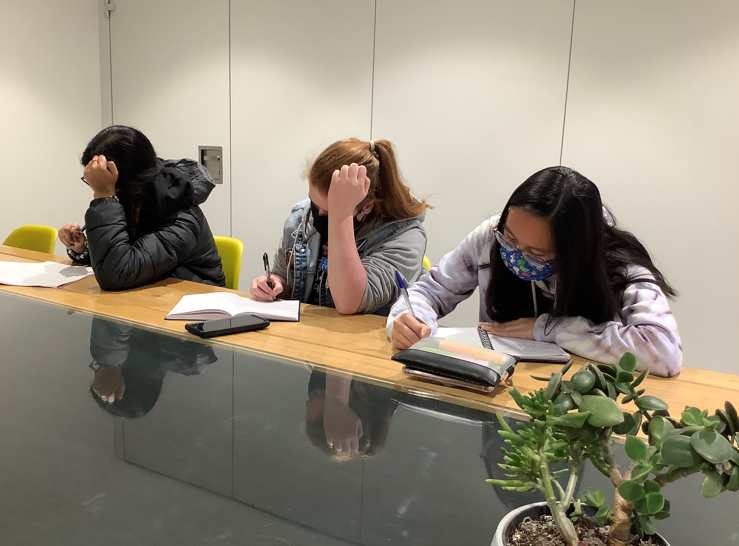
The Gruffalo's Mental Health
This week’s Crow’s Nest began with the prompt to ‘describe your previous week as a household appliance’. Answers included: a toaster so old you’re nervous it will burn your breakfast, an obnoxiously loud vacuum cleaner and… a basic wooden spoon.
Antosh then flagged up this opportunity we shared last week – a callout for diary entry submissions, and we spoke about our own experience of diary writing, how for some of us, it can be a useful method of facing our anger.
Next, Antosh asked us each for a time of day, a weather formation, and a really simple setting / location. Here is what the group came up with:
Time of Day:
4 in the morning
Dusk
Half ten at night
Dawn
1.11pm
Early evening – when the sky starts to dim… low brightness mode
Weather formation:
Burning hot summer
Snowy
Dark but still warm and humid – like a cave
Mist
Partly cloudy
An eastward wind – “something coming in from the west”
Location/setting:
Rooftop of a skyscraper
Field with a river in it
Outside a house
New Zealand
Fantasy medieval city
Inside a mousehole
We were then asked to individually pick an item from each list and use our selection to inform a character in a first-person account.
Our choices were very formative of the tone we would go with. For example, if our character is standing on top of a skyscraper at 1.11pm in the burning hot summer, it strikes a different tone to the voice you would establish with a character outside someone’s house at four in the morning, when it’s misty.
To further inspire us, we read the opening passage to Iain Banks’s The Wasp Factory (see extract below), which left us with lots of questions (about sacrificing mice heads on poles) but a sense straightaway of the kind of world we were in.
Here was Conrad’s writing:
I wandered across the cream-pebbled street with my cloak raised high above my face, distracting eyes from my face to the cloak that masked it. My brisk dance into the alley was aided in great part by the thick and inescapable fact that it was the mist season and at the precise time of 1:11pm it was nearing the thickest mist of the day. The elves and dwarves walked past me in the small trench we found ourselves in. I stepped to my right and opened the back door to “Callum's little shop of Knowledge'' and opened the hatch to the underdark tunnels below. The eyes down here were dull and grey but silver with pointed force. I followed my feet down the lightly pebbled path and arrived at my destination. The altar stood there in all its magnificent and powerful dread, and I knelt down at its clawed feet.
After that exercise, we read ‘How to be an Other Woman’ from Lorrie Moore’s Self-Help (see extract below), feeling the second person narration was detached, as with the heterodiegetic narrator we examined last week. We compared the writing style to the movements of a character in a video game, and the instructions in a cookbook.
We were prompted to write our own second-person account, inspired either by making a new selection from our times, weathers, and settings, or further exploring our scenario from before and wherever it went next.
We were also invited to experiment with sentence variation where, in the passage by Lorrie Moore, lines do not always begin with an article (she, the etc.) but with verbs straight away: “Meet in expensive beige raincoats…”
Some of us struggled to maintain 2nd person, finding it unnatural, like we were controlling and even gaslighting our characters, saying “you did this!”.
We moved onto investigating ‘persona’, a word we understood to mean the way we present in front of other people, in a way that may not be our usual selves.
To aid our investigation, we read ‘Squawk’ from Terrance Hayes’s HipLogic (see extract below), a disturbing utilisation of Big Bird from Sesame Street.
Our task was to think about a mascot or a character from children’s television and explore them in a way that reveals their hidden persona. The group’s focuses included uncovering Dora the Explorer’s psychosis, the darker sides to Charlie and Lola’s domestic life, Loki’s family ties, and the Gruffalo’s mental health.
Katelyn’s writing is shared below.
Crow’s Nest returns next Tuesday at 5.30pm.
Opening to Iain Banks’s The Wasp Factory
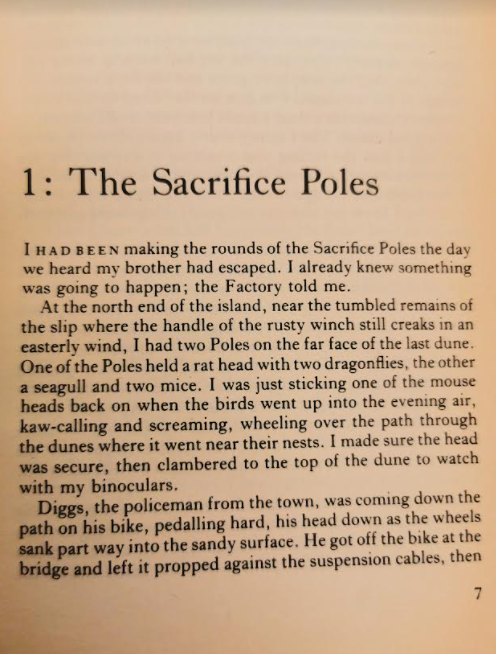
‘How to be an Other Woman’ from Lorrie Moore’s Self-Help
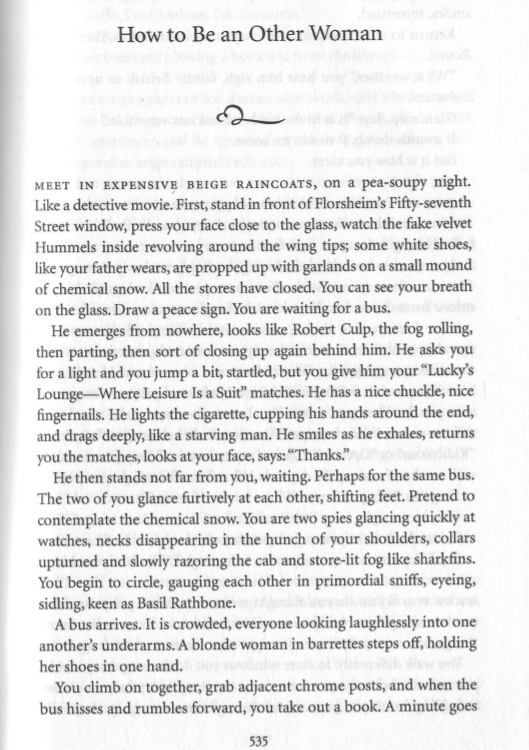
‘Squawk’ from Terrance Hayes’s HipLogic (1/2)
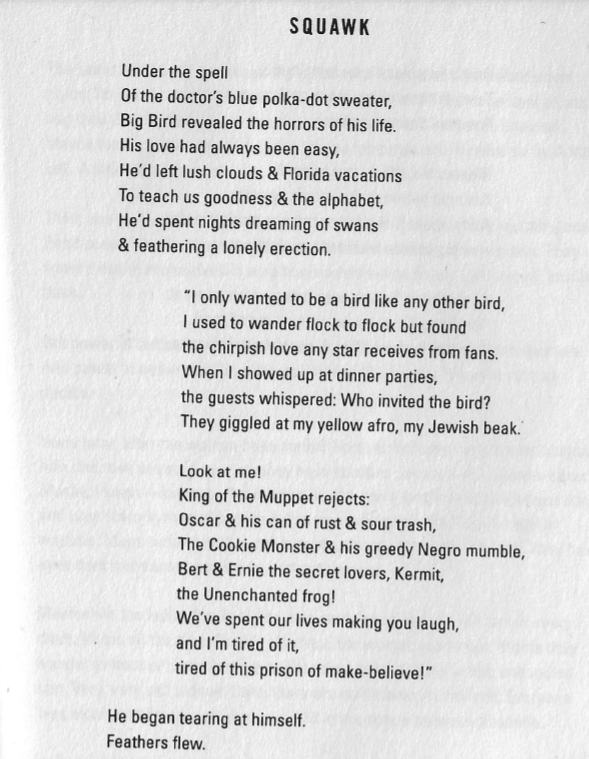
‘Squawk’ from Terrance Hayes’s HipLogic (2/2)
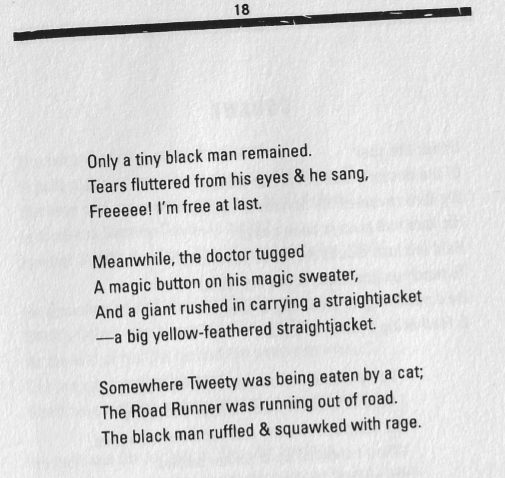
Katelyn's writing (1/2)
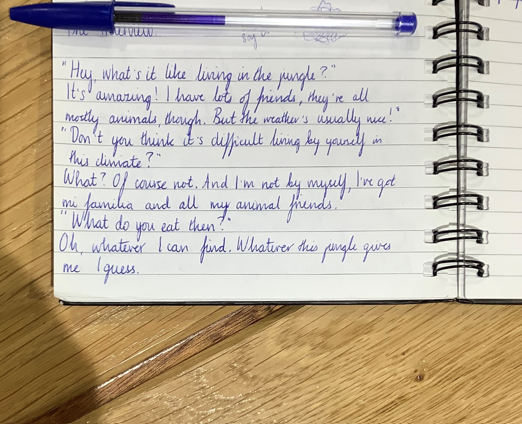
Katelyn's writing (2/2)
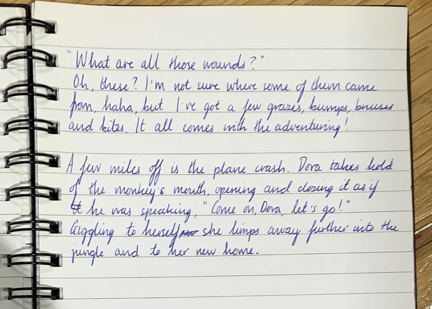
Archive
Junior & Young Writers Week 3: Return From The Magical World
Junior & Young Writers Week 2: African Mythology
Problems, Problems, Problems...
Cautionary Tales & Christmassy Opening Lines
You've Gotta Have Pace, Pace, Pace
Junior & Young Writers Week 1: Alien Encounters
Junior & Young Writers: Week 5 - Play on Words Pt. 2
Junior & Young Writers: Week 11 - end of term showcase [build a bard workshop]
Junior & Young Writers: Week 10 - Greek Theatre - chorus stories
Junior & Young Writers: Week 9 - Greek Origin Stories - Spring
Rubber Ducks & Writing Festivals
Junior & Young Writers: Week 7 - Greek Hero Stories [the 12 labours of Hercules]
Junior & Young Writers: Week 12 [Wild Words] - Stuff & Things
Junior & Young Writers: Week 11 [Wild Words] - World Building 2
Junior & Young Writers: Week 10 [Wild Words] - World Building
Junior & Young Writers: Week 9 [Wild Words] - Mystery & Choose Your Own Adventure
Junior & Young Writers: Week 8 [Wild Words] - Spooky Sequels & Potion Poems
Junior & Young Writers – Week 10 (Writers’ Inspiration) – Final Showcase
Junior & Young Writers – Week 9 (Writers’ Inspiration) – Editing & Performance Tips
Junior & Young Writers – Week 8 (Writers’ Inspiration) – Cuteness
Time goes on by Tavinder Kaur New
Junior & Young Writers – Week 7 (Writers’ Inspiration) – Natural Solutions
Junior & Young Writers – Week 6 (Writers’ Inspiration) – The Language of Fruit and Veg
Junior & Young Writers – Week 5 (Writers’ Inspiration) – Adventures In Space
Tinklebobs and Bedraggled Angles
Junior & Young Writers – Week 4 (Writers’ Inspiration) – Our Environment
Fortune Tellers & Future Letters
Junior & Young Writers – Week 3 (Writers’ Inspiration) – Home
Young Writers - Week 10 (The Art of Writing) – Final Week Showcase
Junior Writers - Week 10 (The Art of Writing) – Final Week Showcase
Young Writers – Week 9 (The Art of Writing) – Choose Your Own Adventure
Junior Writers – Week 9 (The Art of Writing) – Choose Your Own Adventure
Young Writers – Week 8 (The Art of Writing) – Sequel Stories
Junior Writers – Week 8 (The Art of Writing) – Sequel Stories
Young Writers – Week 7 (The Art of Writing) – Picture Prompts
Junior Writers – Week 7 (The Art of Writing) – Picture Prompts
Young Writers - Week 6 (The Art of Writing) - Script-writing & Dialogue
Junior Writers - Week 6 (The Art of Writing) - Script-writing & Dialogue
Junior Writers – Week 5 (The Art of Writing) – Poetry
Young Writers - Week 5 (The Art of Writing) - Poetry Potions
Edward The Martyr - A Competition!
Mood Boards and Postcards from Space
Young Writers - Week 3 (The Art of Writing) - PLOT
Junior Writers - Week 3 (The Art of Writing) - PLOT
Moomin Stories and Hollywood Pitches
Young Writers - Week 2 (The Art of Writing) - Genre & Setting
Junior Writers - Week 2 (The Art of Writing) - Genre & Setting
Prompts, Dialogues, and Cliché
Story Structure Part One: Exposition and Beyond...
Young Writers - Week 1 (The Art of Writing) - Character
Junior Writers - Week 1 (The Art of Writing) - Character
Young Writers - week 4 - Nature Writing [animals & wildlife]
Junior Writers - week 4 - Nature Writing [animals & wildlife]
Young Writers - week 3 - Nature Writing [trees/plants/flowers]
Junior Writers - week 3 - Nature Writing [trees/plants/flowers]
Young Writers - week 2 - 'fractured fairy tales'
Junior Writers - week 2 - 'fractured fairy tales'
Young Writers - week 1 - 'from deep inside a forest'
Creating Communities through Writing
WORDCUP - Hounsdown Session #6
Making pillows in a house full of feathers
WORDCUP - Hounsdown Session #5
Exploring home – a place, person, house
WORDCUP - Hounsdown Session #4
Stories From Our Streets at the Abbeyfield Wessex Society Reminiscence Session at Poole Library
What Do You Really Mean? Writing Dialogue for Scripts
WORDCUP - Hounsdown Session #3
Character Building & Murder Mysteries
Going inside – from a spark to a story
WORDCUP - Hounsdown Session #2
Maybe I Can Be Invisible After All... Monologues
Creative Writing: Fun Facts, Diverse Voices and Different Perspectives
Writing Competition - Stories From Our Streets
Stories From Our Streets Community Activity Pack
Thinking in-quiet, after the fire
Found Cities, Lost Objects: Women in the City Curated by Lubaina Himid CBE
Ekphrastic Jukebox - Writing to Music
ArtfulScribe LitFest Community Showcase 2023
Young writers exercise their creative power
Writing to The Sorcerer's Apprentice
The Mousetrap - Mayflower Young and Junior Writers Investigate Mystery!
Stories From Our Streets Launch!
Interview: In Conversation with Dr Victoria Leslie
The Missing Farmer/ Blackout Poetry & DADA
Exploring this wonderful World
Using props to create characters/ working as a writing room
Stories of the Dust and Character Questions
Storytelling and Escalation or Rising Action
Junior Writers Club Acrostic Poem
Notes on Intention for MAST Collective - Year 3 - Facilitation Focus
Earthquakes & Dominoes - MAST Collective Blog #4
SUPER MARIO AND POP CULTURE POEMS
Receptionists & Inky Voids - MAST Collective Blog #3
Saying No and saying YES on National Poetry Day!
There's a Dragon in the Wardrobe...
House Warming Party (The Mortifying Ordeal of Being Known) - MAST Collective Blog #2
Intern Blog 5 - The Publishing Process
POEMS TO SOLVE THE CLIMATE CRISIS
On The Streets With Theresa Lola
Intern Blog 4 - The Internship Journey
NEW DIRECTIONS, STARTING SMALL - THE ORWELL YOUTH PRIZE
LIGHTHOUSES, HOPE AND METAPHORS
on workshop and transformations: frogs, lions, and the duck that becomes a larder...
Poetry Ambassadors - Interview with April Egan
Intern Blog 1 - Finding a Voice
World Poetry Day: Fluffypunk and the Invisible Women
On Being a Writer: A Conversation by Beth Phillips & Sam Morton
Poetry Ambassadors - Interview with Kaycee Hill
UNHEARD VOICES: INTERNATIONAL WOMEN'S DAY, AND STORIES OF CONFLICT













